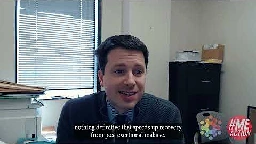
Medical Professionals
- Introductions and looking for friends!
Post here with your title/role/qualifications and whatnot if you want to. If you want to post a region or field to look for folks in your area to network a bit, this is the place to do it!
Be respectful of people's privacy and do not dig for details. Put a note in the top of your comment if you are open to messages and/or questions.
- Medical system navigation post!
(At the moment, this is likely to be America-centric for system questions unless/until we get more international representation.)
Please post queries here if you are looking for advice on what kind of specialist to seek out for medical problems. Keep descriptions of the medical concern in question brief, and limit discussion of personal details.
THIS IS NOT A SUBSTITUTE FOR PROFESSIONAL PHYSICIAN/PATIENT RELATIONSHIPS. THIS IS EXCLUSIVELY FOR HELP NAVIGATING THE MEDICAL SYSTEM.
- Leaked Training Shows How Doctors in New York’s Biggest Hospital System Are Using AIwww.404media.co Leaked Training Shows How Doctors in New York’s Biggest Hospital System Are Using AI
At Northwell Health, executives are encouraging clinicians and all 85,000 employees to use a tool called AI Hub, according to a presentation obtained by 404 Media.

cross-posted from: https://lemmy.ca/post/31913012
> My thoughts are summarized by this line > > > Casey Fiesler, Associate Professor of Information Science at University of Colorado Boulder, told me in a call that while it’s good for physicians to be discouraged from putting patient data into the open-web version of ChatGPT, how the Northwell network implements privacy safeguards is important—as is education for users. “I would hope that if hospital staff is being encouraged to use these tools, that there is some significant education about how they work and how it's appropriate and not appropriate,” she said. “I would be uncomfortable with medical providers using this technology without understanding the limitations and risks. ” > > It's good to have an AI model running on the internal network, to help with emails and the such. A model such as Perplexity could be good for parsing research articles, as long as the user clicks the links to follow-up in the sources. > > It's not good to use it for tasks that traditional "AI" was already doing, because traditional AI doesn't hallucinate and it doesn't require so much processing power. > > It absolutely should not be used for diagnosis or insurance claims.
- Applications wanted for Genetics Post-Doc specialised in ME at University of Viennawww.s4me.info ME/ CFS post doc post at Medical university of Vienna
In case it's of interest for someone [MEDIA] ME/CFS genetics postdoc post available at the Medical University of Vienna. The position is either...

- Dr. Glaucomflecken on the IV Fluid Shortage
YouTube Video
Click to view this content.
Having just completed my surgery clerkship, this is surprisingly accurate.
- Dr. Glaucomflecken is, as always, on point.
YouTube Video
Click to view this content.
Let's hope Cigna catches some real consequences this time. (Not likely, but we can hope.)
- Medical Education on Post-Exertional Malaise and Pacing in ME and Long COVID patients (Video) Dr Brayden Yellman et al.youtube.com Medical Education on PEM & Pacing #MedEdMonday
#MEAction and Patient-led Research Collaborative have created a four-part video series focusing on post-exertional malaise and pacing. Each video includes an...

- Implicit Biases are very important to be aware of in healthcare. This is a project that has a bunch of implicit bias testing, and I think it's worthwhile to recognize your own biases.
I like to go through and take a couple of these tests every now and then to kind of check up on myself to make sure I'm not developing biases that will negatively impact my ability to care for my patients. I think it's probably a good idea to at least get a baseline for yourself so you know when you're most likely going to need to self-monitor what you say and do more closely.
- Patients with severe ME at risk of starvation
Nearly 200 health professionals have written to the health secretary saying that patients with the illness are being left to ‘languish behind closed doors’
The Times (UK)
Doctors have said that NHS patients with myalgic encephalomyelitis (ME) risk starving to death because of unsafe and “unconscionable” standards of care.
The letter calls for the government to take action to address the “serious patient safety concerns” for patients with ME, an illness which affects about 250,000 people in the UK.
More than 200 health professionals including GPs, hospital consultants and nurses have written to Wes Streeting, the health secretary, saying that patients with the illness are being left to “languish behind closed doors” because specialist NHS services to provide safe care “do not exist”.
ME, also known as chronic fatigue syndrome, is a complex neurological disorder that leads to symptoms including extreme exhaustion. Severe cases can be fatal, with patients bedridden and unable to eat or drink, but these patients currently “fall through the cracks” as there is no specialist NHS care provision.
A letter signed by 202 doctors and NHS staff calls on ministers to convene an ME clinical task force providing “emergency specialist guidance in cases where patients are hospitalised”, as well as to commit to holding NHS trusts “accountable” for care.
They write: “There is little access to truly specialist ME care or treatment within the NHS and paradoxically, the sicker a patient is, the less care they receive.
“Even if doctors and healthcare professionals are knowledgeable and willing to treat patients, the infrastructure to provide safe and appropriate care does not exist.”
[…]
- For folks still in training, how do you try to present yourself to new preceptors when first meeting them?
Personally, I try to present myself as excited for the training with some degree of competence without trying to pretend like I already know....anything? I feel like I have some trouble striking the perfect balance between competent and receptive, or maybe it's a balance between confidence and humility.
I think erring on the side of humility and receptiveness is a better bet if you're not sure where the balance is, but I'd like to hear from other folks' experiences and perspectives.
(I'd also be grateful for perspectives from folks who have been preceptors or instructors!)
- Resources to share with patients
I'm currently in my Family Med clinical rotation, and our professor has us working on social determinants of health stuff for the didactic/academic portion. To that end, she sent us some resources and then I dug up a bunch more, so I wanted to share links to the resources I found in case anyone finds them useful in their practice for helping patients with SDOH needs.
Unfortunately, these are all going to be American resources, but hopefully they'll be helpful to someone.
- Neighborhood Navigator for resources by zip code
- Reading Level analyzer for patient instructions.
- SAGE - Resources for LGBTQ+ Elders
- Medigap/Medicare Part C for supplemental and prescription drug coverage
- Medicare Savings Programs for low-income seniors
- Supplemental Security Income assistance for seniors and people with disabilites
- Aid Access - Buy abortion pills online
- Dental Care state programs
- Free or Low Cost Eye Care
- Hearing Aid Project
- Google Doc of OB/Gyns known to do hysterectomies
If there are any other resources you know about, please share them in the comments! This stuff is so important for healthcare access, but they can be really hard to track down sometimes.
